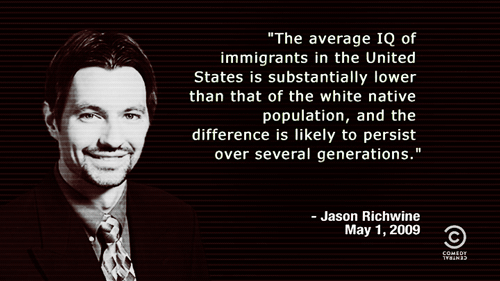“The truth is, most of us discover where we are headed when we arrive.”
 ‘Tis the season for glorious life advice dispensed by cap-and-gown-clad elders to cap-and-gown-clad youngsters, emanating a halo effect of timeless wisdom the rest of us can absorb any day, at any stage of life. On May 20, 1990, Bill Watterson, creator of the beloved Calvin and Hobbes comic strip, took the podium at Kenyon College — the same stage David Foster Wallace would occupy 15 years later to deliver one of history’s most memorable commencement addresses — and gave the graduating class a gift of equally remarkable insight and impact.
‘Tis the season for glorious life advice dispensed by cap-and-gown-clad elders to cap-and-gown-clad youngsters, emanating a halo effect of timeless wisdom the rest of us can absorb any day, at any stage of life. On May 20, 1990, Bill Watterson, creator of the beloved Calvin and Hobbes comic strip, took the podium at Kenyon College — the same stage David Foster Wallace would occupy 15 years later to deliver one of history’s most memorable commencement addresses — and gave the graduating class a gift of equally remarkable insight and impact.
Watterson begins the speech by articulating the same sentiment at the heart of the most unforgettable commencement addresses: the notion that not-knowing is not only a part of the journey, but an integral part:
I have a recurring dream about Kenyon. In it, I’m walking to the post office on the way to my first class at the start of the school year. Suddenly it occurs to me that I don’t have my schedule memorized, and I’m not sure which classes I’m taking, or where exactly I’m supposed to be going.
As I walk up the steps to the postoffice, I realize I don’t have my box key, and in fact, I can’t remember what my box number is. I’m certain that everyone I know has written me a letter, but I can’t get them. I get more flustered and annoyed by the minute. I head back to Middle Path, racking my brains and asking myself, “How many more years until I graduate? …Wait, didn’t I graduate already?? How old AM I?” Then I wake up.
Experience is food for the brain. And four years at Kenyon is a rich meal. I suppose it should be no surprise that your brains will probably burp up Kenyon for a long time. And I think the reason I keep having the dream is because its central image is a metaphor for a good part of life: that is, not knowing where you’re going or what you’re doing.
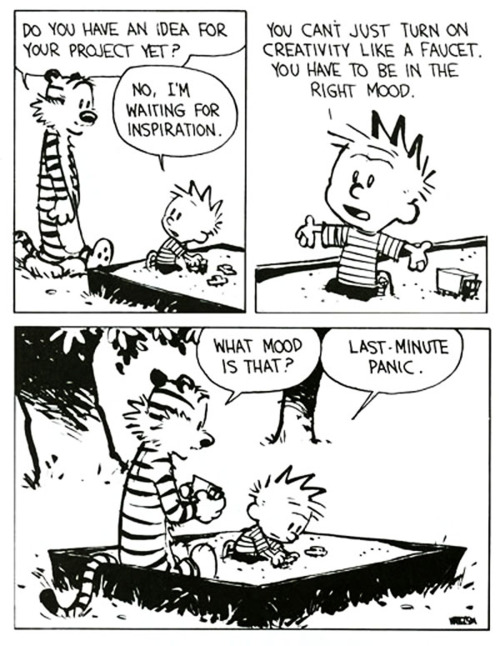
Like Chuck Close (“Inspiration is for amateurs — the rest of us just show up and get to work.”), Isabel Allende (“Show up, show up, show up, and after a while the muse shows up, too.”), E. B. White (“A writer who waits for ideal conditions under which to work will die without putting a word on paper.”), and Tchaikovsky (“A self-respecting artist must not fold his hands on the pretext that he is not in the mood.”), Watterson speaks to the importance of work ethic and grit — but, like Freud, he places playfulness at the epicenter of creativity:
It’s surprising how hard we’ll work when the work is done just for ourselves. And with all due respect to John Stuart Mill, maybe utilitarianism is overrated. If I’ve learned one thing from being a cartoonist, it’s how important playing is to creativity and happiness. My job is essentially to come up with 365 ideas a year.
If you ever want to find out just how uninteresting you really are, get a job where the quality and frequency of your thoughts determine your livelihood. I’ve found that the only way I can keep writing every day, year after year, is to let my mind wander into new territories. To do that, I’ve had to cultivate a kind of mental playfulness.
[…]
At school, new ideas are thrust at you every day. Out in the world, you’ll have to find the inner motivation to search for new ideas on your own. With any luck at all, you’ll never need to take an idea and squeeze a punchline out of it, but as bright, creative people, you’ll be called upon to generate ideas and solutions all your lives. Letting your mind play is the best way to solve problems.
[…]
A playful mind is inquisitive, and learning is fun. If you indulge your natural curiosity and retain a sense of fun in new experience, I think you’ll find it functions as a sort of shock absorber for the bumpy road ahead.
Watterson stresses the importance of refueling the drained creative tank not by indulging in mindless entertainment but by nourishing stimulation — because, after all, “garbage in, garbage out”:
We’re not really taught how to recreate constructively. We need to do more than find diversions; we need to restore and expand ourselves. Our idea of relaxing is all too often to plop down in front of the television set and let its pandering idiocy liquefy our brains. Shutting off the thought process is not rejuvenating; the mind is like a car battery — it recharges by running.

On the importance of defining your own success and holding on to your sense of purpose:
You may be surprised to find how quickly daily routine and the demands of “just getting by” absorb your waking hours. You may be surprised matters of habit rather than thought and inquiry. You may be surprised to find how quickly you start to see your life in terms of other people’s expectations rather than issues.
Recounting his early days of weathering the rejection storm, Watterson illustrates the soul-crushing effect of doing intellectually and creatively vacant money-work rather than work true to your calling:
For years I got nothing but rejection letters, and I was forced to accept a real job.
A REAL job is a job you hate. I designed car ads and grocery ads in the windowless basement of a convenience store, and I hated every single minute of the 4-1/2 million minutes I worked there. My fellow prisoners at work were basically concerned about how to punch the time clock at the perfect second where they would earn another 20 cents without doing any work for it. … It was a rude shock to see just how empty and robotic life can be when you don’t care about what you’re doing, and the only reason you’re there is to pay the bills.
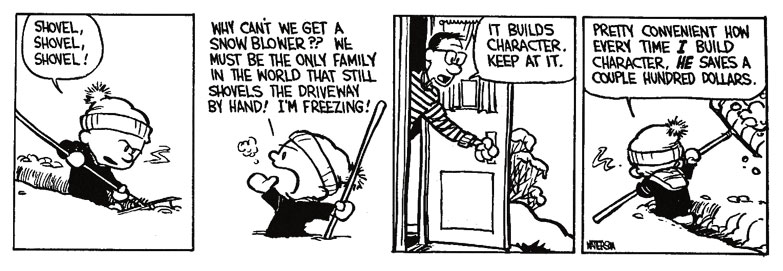
In fact, the central message of Watterson’s speech is that the myth of the overnight success is just that — a myth — something cultural icons like Thomas Edison and Alexander Graham Bell knew well. At the end of the day, what counts is not prestige or money but pure joy in the work:
I tell you all this because it’s worth recognizing that there is no such thing as an overnight success. You will do well to cultivate the resources in yourself that bring you happiness outside of success or failure. The truth is, most of us discover where we are headed when we arrive. At that time, we turn around and say, yes, this is obviously where I was going all along. It’s a good idea to try to enjoy the scenery on the detours, because you’ll probably take a few.
I still haven’t drawn the strip as long as it took me to get the job. To endure five years of rejection to get a job requires either a faith in oneself that borders on delusion, or a love of the work. I loved the work.
Drawing comic strips for five years without pay drove home the point that the fun of cartooning wasn’t in the money; it was in the work. This turned out to be an important realization when my break finally came.

But as his comic strip became wildly successful and he was tossed into the $12-billion-a-year cartoon merchandising business, Watterson found himself “spending almost as much time screaming at executives as drawing” and saw the gruesome other side of the same coin:
Selling out is usually more a matter of buying in. Sell out, and you’re really buying into someone else’s system of values, rules and rewards.
The so-called “opportunity” I faced would have meant giving up my individual voice for that of a money-grubbing corporation. It would have meant my purpose in writing was to sell things, not say things. My pride in craft would be sacrificed to the efficiency of mass production and the work of assistants. Authorship would become committee decision. Creativity would become work for pay. Art would turn into commerce. In short, money was supposed to supply all the meaning I’d need.
But of course even then, long before the proclaimed “new age of fulfillment, in which the great dream is to trade up from money to meaning,” Watterson knew that what was being offered to him was a robbery rather than a gift. In reflecting on the experience, he revisits the question of work ethic, this time in light of defining your own success:
You will find your own ethical dilemmas in all parts of your lives, both personal and professional. We all have different desires and needs, but if we don’t discover what we want from ourselves and what we stand for, we will live passively and unfulfilled. Sooner or later, we are all asked to compromise ourselves and the things we care about. We define ourselves by our actions. With each decision, we tell ourselves and the world who we are. Think about what you want out of this life, and recognize that there are many kinds of success.

He stresses the vital difference between “having an enviable career” and “being a happy person,” admonishing about the “hedonic treadmill” of achievement:
Creating a life that reflects your values and satisfies your soul is a rare achievement. In a culture that relentlessly promotes avarice and excess as the good life, a person happy doing his own work is usually considered an eccentric, if not a subversive. Ambition is only understood if it’s to rise to the top of some imaginary ladder of success. Someone who takes an undemanding job because it affords him the time to pursue other interests and activities is considered a flake. A person who abandons a career in order to stay home and raise children is considered not to be living up to his potential — as if a job title and salary are the sole measure of human worth.
You’ll be told in a hundred ways, some subtle and some not, to keep climbing, and never be satisfied with where you are, who you are, and what you’re doing. There are a million ways to sell yourself out, and I guarantee you’ll hear about them.
To invent your own life’s meaning is not easy, but it’s still allowed, and I think you’ll be happier for the trouble.
He concludes by echoing Rilke:
Your preparation for the real world is not in the answers you’ve learned, but in the questions you’ve learned how to ask yourself.
Complement with more soul-stirring wisdom from Debbie Millman, Neil Gaiman, Greil Marcus, David Foster Wallace, Jacqueline Novogratz, Ellen DeGeneres, Aaron Sorkin, Barack Obama, Ray Bradbury, J. K. Rowling, Steve Jobs, Robert Krulwich, Meryl Streep, and Jeff Bezos.
Thanks, @monicapillai
Donating = Loving
Bringing you (ad-free) Brain Pickings takes hundreds of hours each month. If you find any joy and stimulation here, please consider becoming a Supporting Member with a recurring monthly donation of your choosing, between a cup of tea and a good dinner:
|
|
♥ $7 / month♥ $3 / month♥ $10 / month♥ $25 / month |

You can also become a one-time patron with a single donation in any amount:

 Brain Pickings has a free weekly newsletter. It comes out on Sundays and offers the week’s best articles. Here’s what to expect. Like? Sign up.
Brain Pickings has a free weekly newsletter. It comes out on Sundays and offers the week’s best articles. Here’s what to expect. Like? Sign up.
Brain Pickings takes 450+ hours a month to curate and edit across the different platforms, and remains banner-free. If it brings you any joy and inspiration, please consider a modest donation – it lets me know I'm doing something right.



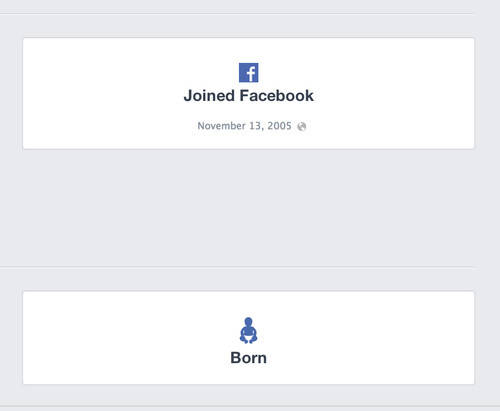
![]()






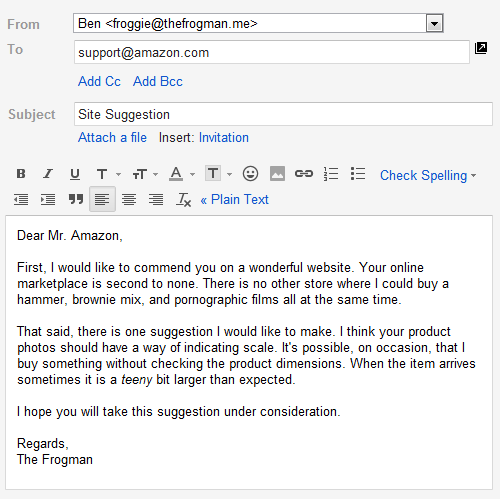




 [Advertisement] Make your team a DevOps team with
[Advertisement] Make your team a DevOps team with  ‘Tis the season for
‘Tis the season for 







